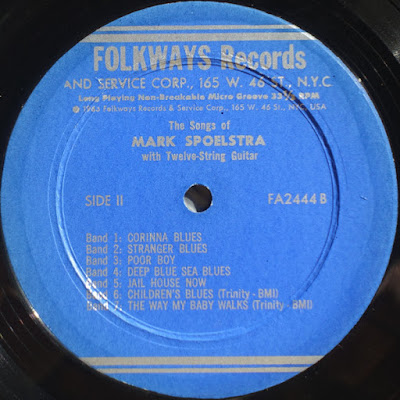Mark Warren Spoelstra (June 30, 1940 – February 25, 2007) was an American singer-songwriter and blues guitarist who was an important figure in the folk music renaissance of the 1960’s.
Born and raised in Kansas City to a Quaker family, Spoelstra's musical journey began after a move to El Monte in California when, at the age of 11, he began taking guitar lessons. A couple of years later, the budding guitarist found himself playing at his first professional gig at a house concert in the San Marino region of the state before gaining experience by playing live at various folks clubs in the surrounding area - including a support slot for revered blues duo Sonny Terry and Brownie McGhee at Hollywood's influential Ash Grove nightclub.
Before long, Spoelstra made the move to Berkeley in San Francisco and finally New York where he landed a recording contract with the pioneering Folkways Records which in turn spawned the 1963 albums 'The Songs Of Mark Spoelstra With Twelve String Guitar' and 'Mark Spoelstra Recorded At Club 47 Inc'.
Here's “Stranger Blues” from above album.
It was around this time that Spoelstra became friends with a certain Bob Dylan who himself was starting out as a singer/songwriter on the Greenwich Village scene. Spoelstra would find himself occasionally performing with Dylan at the plethora of folk clubs that were scattered around the
Village and went on to play at prestigious events such as the Newport Folk Festival and the Carnegie Hall Hootenanny. Tours of Europe and Canada followed but it sparked an unease in Spoelstra that would significantly influence his later career choices.The decision to pull back from performing was initially taken out his hands on account of an obligation to perform alternative service in Fresno, California thanks to his stance as a conscientious objector at a time when young US men were still being compulsorily drafted into the armed forces. "Because I was raised as a Quaker in Southern California, I really believed that I was not going to put on a uniform ever except the possibility perhaps of becoming a medic and going in as a non-combatant," Spoelstra recalled later. "I really felt that it was just wiser to do something that was more positive, like community development work. That's what I did for two years."
Following his stint of alternative service, Spoelstra went on to record two acclaimed albums for the Elektra label - 'Five & Twenty Questions' (1965) and 'State Of Mind' (1966). His songs would prove popular with audiences and fellow performers alike with upcoming socially-conscious artists such as Joan Baez and Harry Belafonte. Up until the end of the '70s, Spoelstra would record a handful of albums for different labels as well as getting involved in side projects such as appearing on the soundtrack of the 1973 film Electra Glide In Blue and setting up the short-lived Frontier Constabulary band.
During this time, Spoelstra had taken the decision to withdraw from touring and settle down near Modesto in California where he and his wife Sherry raised a family with the couple fully embracing Christianity as a way of life. By 1974, Spoelstra had enrolled in the Two Year Discovery Art Guild Internship Program of Intensive Bible Study at Peninsula Bible Church, in Palo Alto, California, eventually leading to him becoming a minister of music. Spoelstra subsequently began issuing albums once more, such as 'Somehow I Always Knew' (1977) and 'Comin' Back To Town' (1979).
However, Spoelstra had effectively retired from professional music by 1980 to take up a number of different day jobs including a stint as a tour bus driver at the world famous Yosemite National Park which allowed him to spend quality time with his children and subsequent grandchildren whilst still being able to connect with people on a daily basis amidst the spectacular waterfalls and granite mountains of his workplace.
At the turn of the millennium, Spoelstra found himself back in the studio to record the well-received 2001 album 'Out Of My Hands' which saw the now seasoned singer/songwriter offer up a new set of songs under the production auspices of Michael Kieffer and Cary Ginell. It was the first record he'd made in 20 years.
In the following few years, Spoelstra would occasionally perform on stage and would do so until the summer of 2006 when illness took its toll. Sadly, Mark Spoelstra passed away in February 2007 following complications brought on by pancreatic cancer leaving behind a small but perfectly-formed back catalogue of songs that continue to attract and inspire new listeners through reissues and the accessibility of the internet.
(Edited mainly from a tribute by Lins Honeyman @ Cross Rhythms)


























































